
How do I recognise a good Stevia Product?
Stevia is a plant from South America from which the sugar substitute of the same name can be obtained, which is now enjoying great popularity. Many people have realised that there are healthier alternatives to traditional sugar that can sweeten coffee, desserts or life itself. For this reason, we give you a detailed overview of Stevia here. Is it really as good as claimed or is it a real health risk?
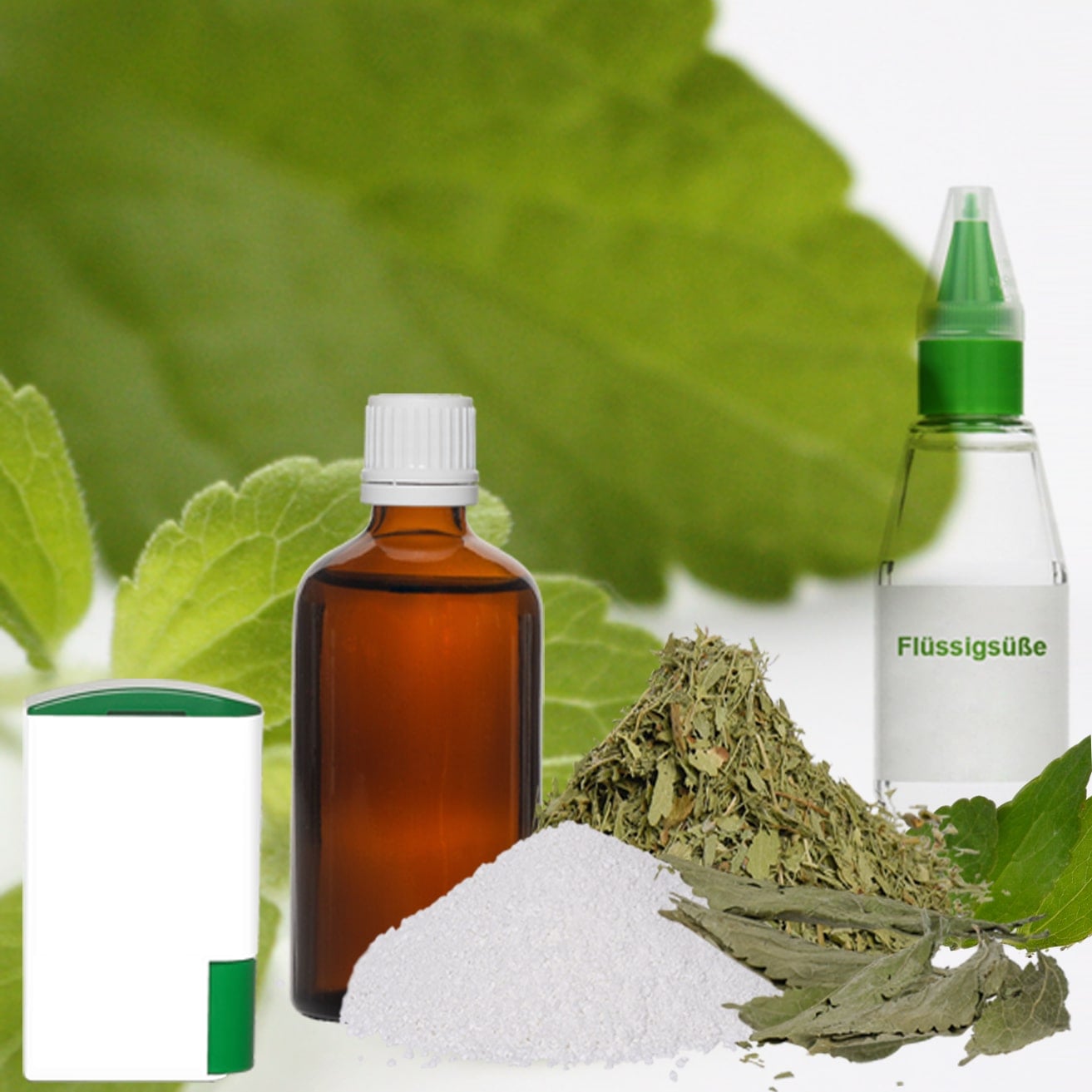
How do I recognise a good Stevia Product?

Reduce sugar consumption and use sugar alternatives.
Reduce sugar consumption – why?
Sugar substitutes are very popular with consumers. Before we talk about Stevia, let’s explain where this comes from. It is actually very simple. It is now well known that sugar, when consumed regularly or in large quantities, is not exactly beneficial to health. For active athletes, the effect of sugar consumption is different. For them, sugar is usually converted into starch. For most people, however, exercise is not part of the daily schedule – especially in increased amounts, household sugar or fructose is converted into fat. In the long run, this increases the risk of many metabolic diseases.
Stevia compared to sugar
Therefore, everyone should seriously reconsider their sugar consumption and consider replacing sugar with healthier alternatives. It is often worth it, because coffee and other foods do not taste good with only the sweetness of industrially produced sugar!
The different Sugar Alternatives
“Away from sugar” is the motto and towards the alternatives of harmful household sugar. First of all, a distinction should be made between so-called sugar substitutes and the sugar substitutes or natural sweeteners.
Maple syrup, honey, xylitol are sugar substitutes
Sugar substitutes are mostly calorie-containing sugar alternatives whose range of use and ratio are very similar to that of sugar. They include, for example, maple syrup, erythritol honey and xylitol. They taste good, are very popular and usually have almost no side effects.
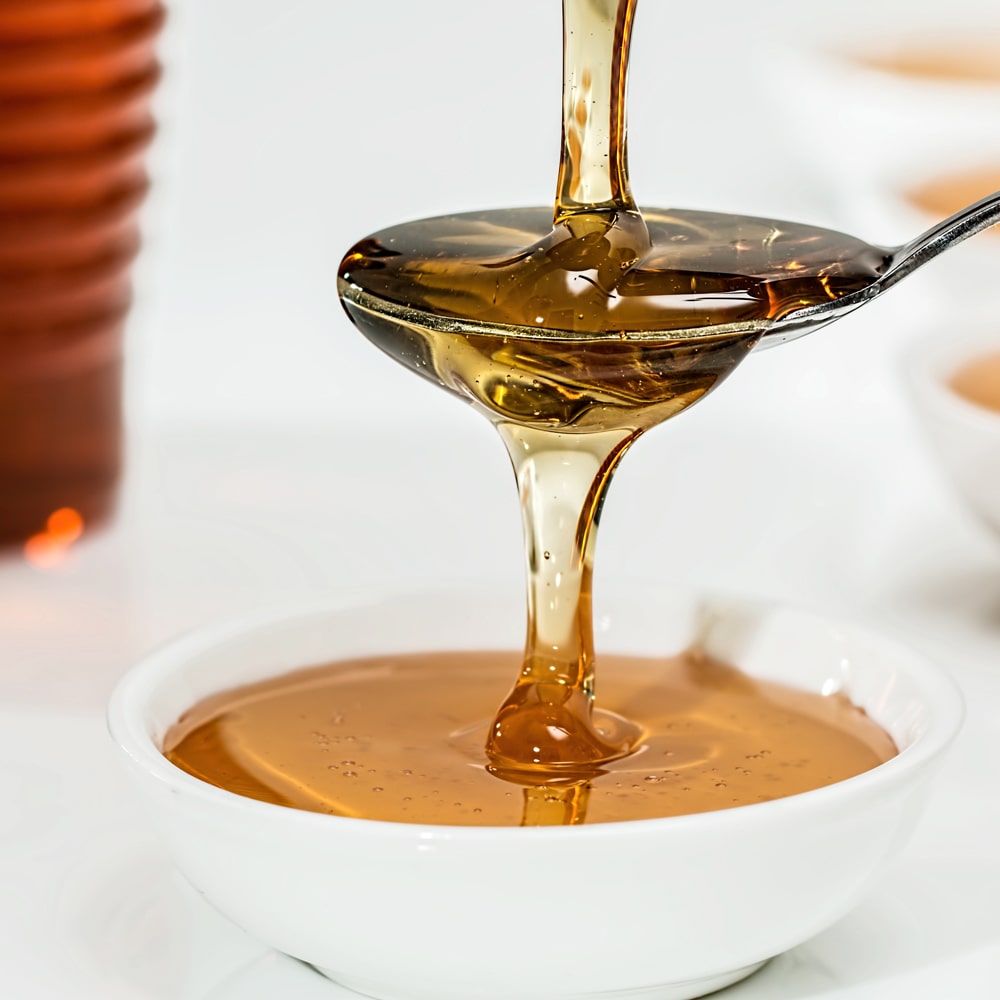
Sugar substitutes are mostly calorie-containing sugar alternatives.
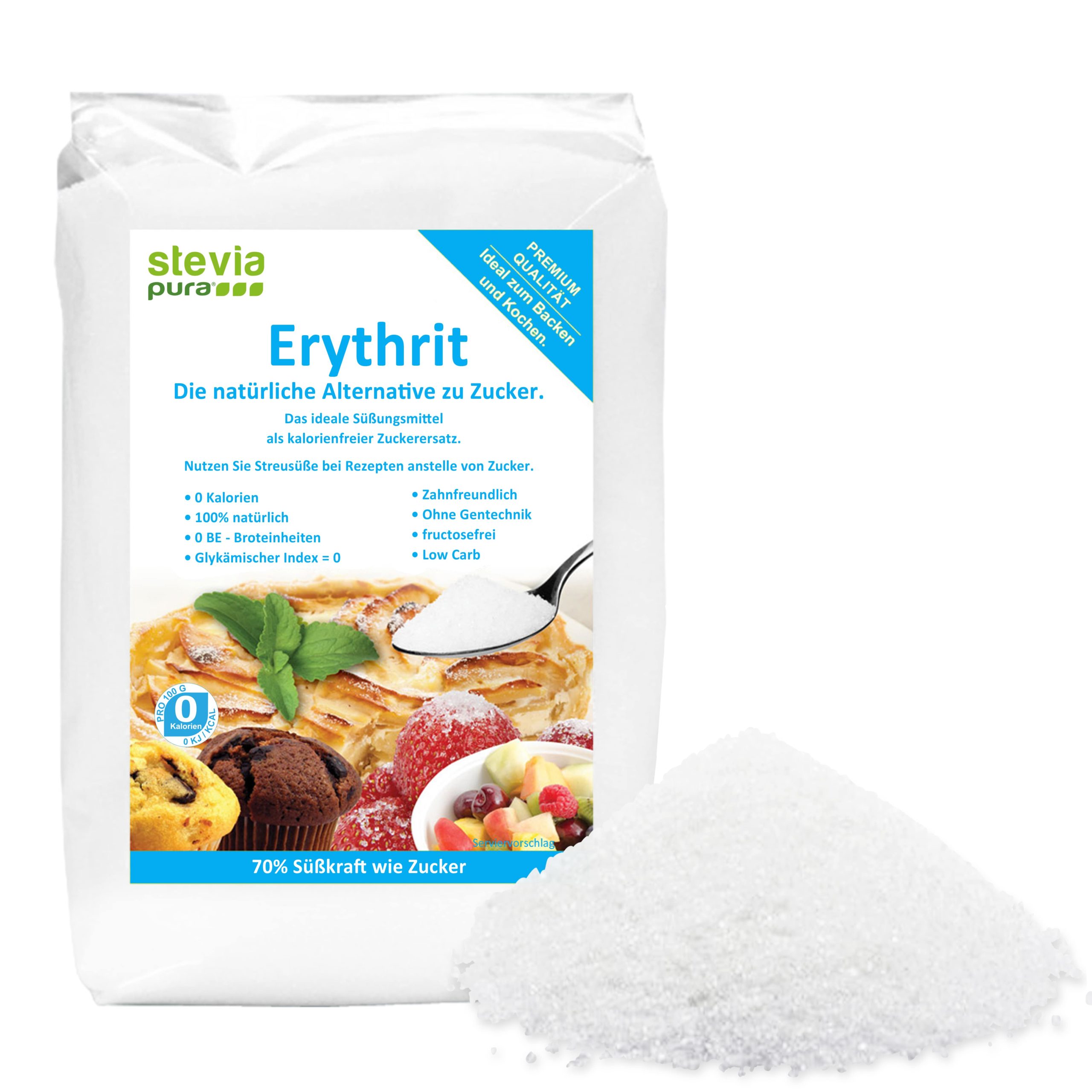
Erythritol sugar substitute is suitable for diabetics.
Maple syrup and honey
According to research, natural honey has a significantly more positive effect on blood sugar levels compared to conventional sugar. People who have problems with blood sugar fluctuations can achieve a significantly more stable value with honey. The effect is similar with maple syrup. In general, when buying sugar substitutes (such as honey and maple syrup), make sure that they are of good quality, as the differences are sometimes very great. Organic honey from beekeepers, for example, is usually of much higher quality than the cheap, mostly mixed types of honey from the supermarket.
Erythritol and Xylitol
Other well-known sugar substitutes include erythritol and xylitol. Erythritol occurs naturally in ripe fruits and is obtained through the fermentation of carbohydrates. Birch sugar (“xylitol”), on the other hand, is not extracted from the Finnish birch tree, as is often assumed, but is very often produced from maize. The calorie content of this sugar alternative is only 40 % less than sugar. The sweetening power, however, is somewhat lower. The disadvantage is that it has a laxative effect when consumed in large quantities.
Erythritol is better digestible compared to other sugar alcohols and offers other advantages. With a glycaemic index of zero, erythritol has no effect on blood sugar levels and, as a sugar substitute, has no calories. This sugar substitute is suitable for diabetics because erythritol is metabolised independently of insulin.
Erythritol is also a good alternative to sugar for fructose intolerance because it does not affect glycogen metabolism and is free of fructose. A healthy sugar substitute in terms of your teeth, erythritol helps maintain tooth mineralisation. As a spoonable sweetener mixture erythritol and Stevia has the advantage that it can be used 1 to 1 like sugar. Spoonable sweetener is therefore much cheaper to use than pure erythritol or xylitol.
Did you know: These sugar substitutes are often advertised as healthier than they actually are: for example, agave syrup, date syrup, coconut flower syrup and! Often advertised as “superfoods”, their fructose content is much higher than that of sucrose. The products consist entirely of cane sugar and have few nutrients. Superfood is a marketing term, not a scientific one. The effect of superfoods lacks any scientific basis and in the issue of 20.10.2016, Ökotest called 21 superfoods in the test Supertox. It is better to eat a healthy balanced diet with fresh fruit and vegetables.
Sweeteners: Stevia, aspartame, clyclamate aspartame, sucralose, acesulfame-K and saccharin
Sweeteners and sweetening agents have no calories and have a significantly higher sweetening power than sugar. They are therefore also called intense sweeteners. A distinction is made between natural sweeteners that occur naturally and artificial sweeteners that are produced synthetically. However, experience has shown that artificially produced sweeteners such as aspartame, clyclamate, sucralose, acesulfame-K and saccharin always cause side effects in the long run because the human body is not used to them from nature. At the same time, most of them have not been fully investigated to rule out possible long-term effects and to recommend them without reservation. Each consumer should decide on consumption for themselves.
Artificial sweeteners with high sweetening power include:
- Aspartame
- Acesulfame K
- Cyclamate
- Saccharin
- Sucralose
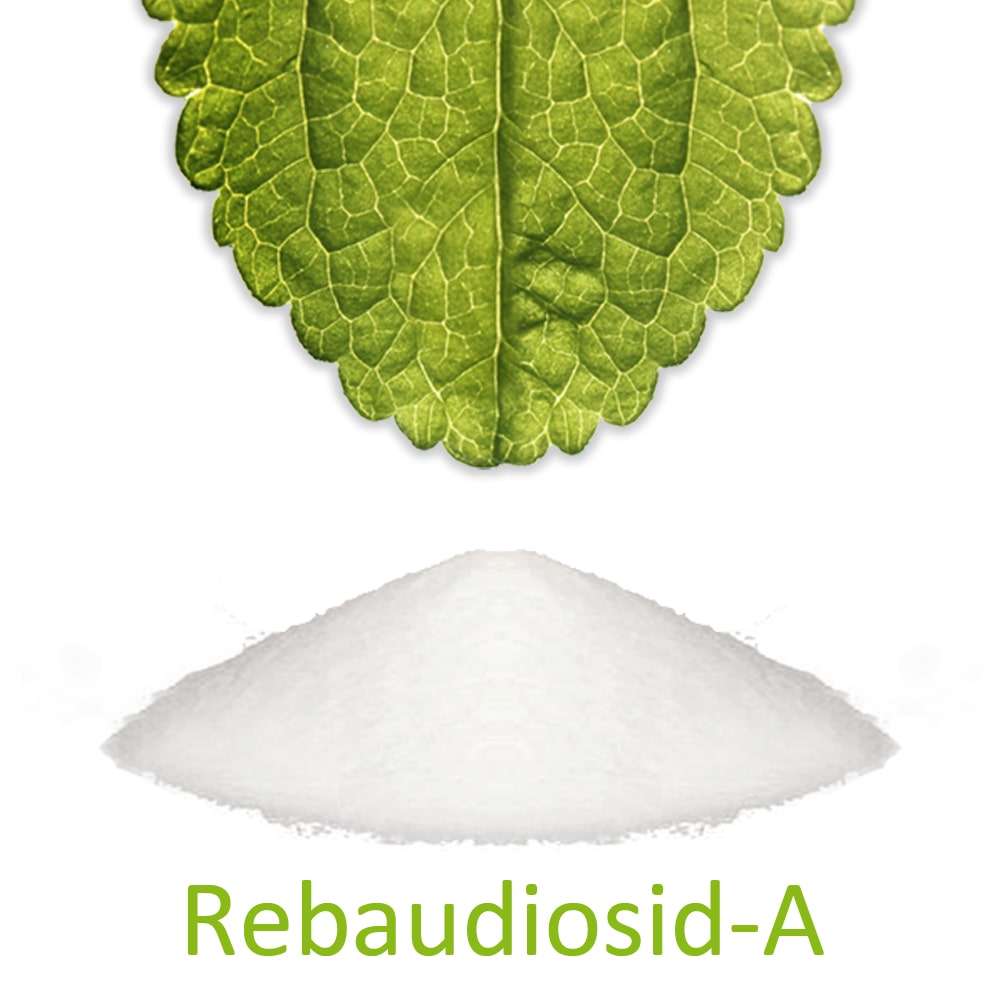
High Quality Stevia Extract: Rebaudioside-A 98%

Stevia Sweetener Tablets for coffee.
Stevia – the Natural Sweetener
There are very few natural sweeteners without known long-term damage. Stevia is one of them, which is made from the plant of the same name. The Stevia plant originally comes from South America. Stevia is sold as a sweetener in liquid, powder and sweetener tablet form. However, Stevia is also contained in various ready-made products such as jam, ketchup, sweets, chocolate or cola. Like other sweeteners, Stevia has a unique taste. If you want to use Stevia for sweetening, you should make sure that the Stevia product is of high quality. You can tell by the purity; the minimum content of steviol glycosides should be at least 95%. High-quality Stevia products use so-called rebaudioside-A from 60% to 98%. These have the best taste and are not bitter when dosed correctly.
Which Sweetener is best for coffee?
If you are now wondering which sugar substitute for coffee can replace the sugar in coffee, you will encounter thousands of different opinions. However, experience has shown that there are only a few sweeteners that really go well with the different flavours of coffee. These include, above all, the sugar substitutes erythritol and Stevia. However, everyone has to decide for themselves what they really like and what tastes less good. Another important question is whether, in the end, only the taste should count or whether you want to do without calories completely.

Sweeten coffee with Stevia.
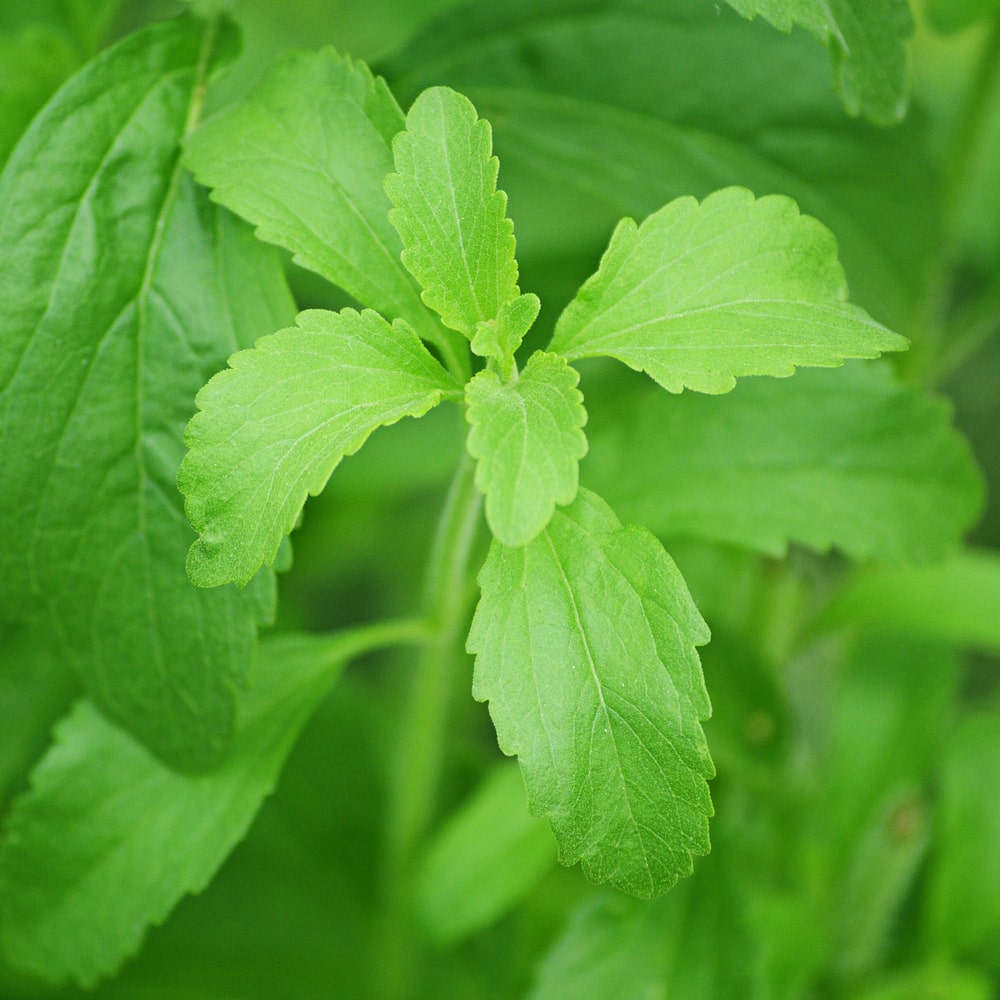
The leaves of the Stevia plant.
Did you know that coffee itself contains almost no calories, as long as you pay attention to a few basic things when drinking coffee?
Stevia: A suitable sugar substitute for coffee
Stevia is now widely used as a sugar substitute for coffee. This is definitely welcome as it is a 100% natural sugar substitute. So let’s take a closer look at this natural sweetener alternative to white table sugar.
What is Stevia?
Stevia is a plant with the botanical name “Stevia rebaudiana”, it is also called “sweet-, honey herb or sweet leaf”. Originally, the Stevia plant comes from the rainforests of South America. The indigenous people of Paraguay and Brazil have been using Stevia for thousands of years, and not just for sweetening. It is also believed that this herb was used for medicinal purposes, e.g., for problems with diabetes and obesity. Today, Stevia is cultivated all over the world, wherever climatic conditions allow. Not only in Brazil and Paraguay, but also in China, Kenya, the USA and also in Europe Stevia is cultivated.
Stevia does not bear the name “sweet herb” for nothing. The so-called steviol glycosides are responsible for the sweetness of the plant: these are the polyvalent sugar alcohols present in the leaves. Due to their chemical properties, they bind to the receptors in our mouth that transmit “sweetness” signals. Stevia was first approved as a sweetener in Japan in the 1970s. In 2008, Australia, New Zealand and the USA followed, and in 2011, the European Food Safety Authority (EFSA) approved it in Europe at 4 mg per kilogram of body weight.
Advantages and disadvantages of the natural sweetener Stevia
Stevia sweetener has many users and is becoming more and more popular but not everyone likes Stevia. There are also a few critical voices. Is it really a sustainable and healthy sugar substitute? What are the advantages and disadvantages of Stevia?
The advantages of Stevia as a sweetener
Some of the Stevia products currently available on the market differ enormously in quality. It is decisive for the taste and effect of the sweetener. You should therefore look carefully when buying Stevia products. The rule quality before quantity should have priority in your purchase decision.
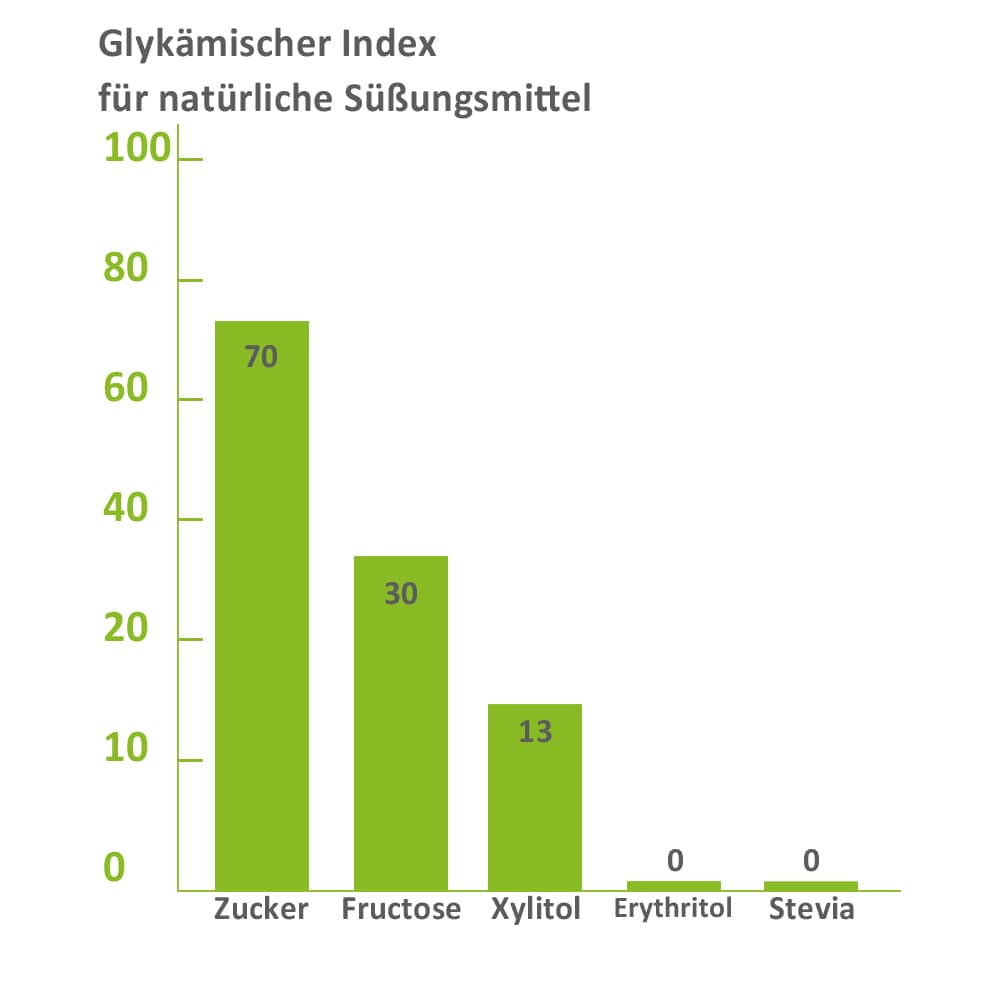
Glycaemic index for natural sweeteners in comparison.
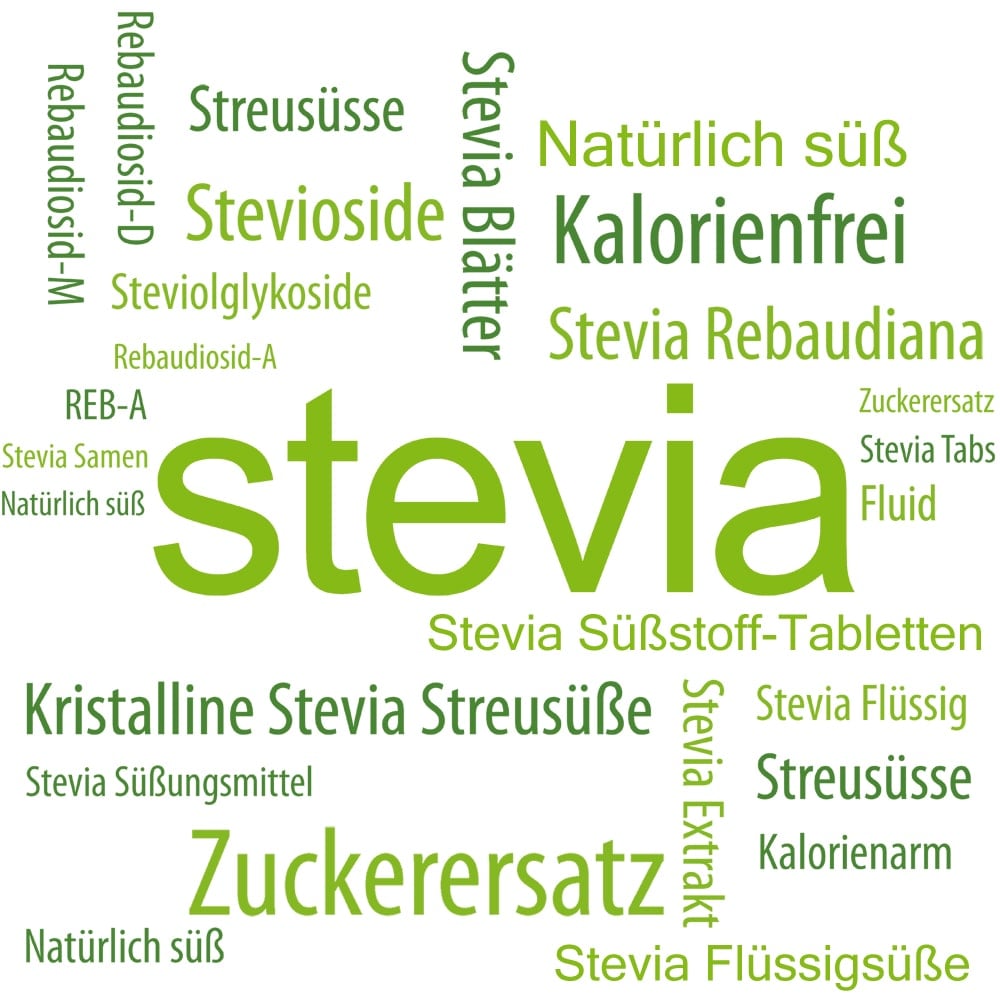
Stevia as a sugar substitute and sweetener.
Stevia offers these benefits:
- 100% natural sweetener
- Up to 450 times sweeter than table sugar
- May prevent cravings | US National Library of Medicine National Institutes of Health
- 100% calorie free
- Lyme disease antibacterial effect | European Journal of Microbiology and Immunology
- Few or no side effects
- Does not affect blood sugar levels | MNT
The disadvantages of Stevia
Even in nature, there are no miracle products completely without disadvantages. Stevia sweeteners can also have disadvantages, but these are mostly due to the quality of the extracts used.
Stevia can have the following disadvantages:
- The natural perception of sweetness can be impaired by excessive consumption of Stevia.
- Stevia products and extracts sometimes show extreme differences in quality and taste
- Slightly bitter aftertaste with very low product quality
In conclusion, it can be said that Stevia has both advantages and disadvantages. However, the disadvantages of the sweetener are mainly related to product quality and subjective perception. If consumed in moderation, there is not much to be said against Stevia from a health point of view than with synthetic sugar substitutes. How do you recognise good Stevia products?
How to recognise a good Stevia product and sweetener
Stevia is found in a variety of products, including beer, fruit juices, yoghurt, jams, sauces, chocolate and sweets. As a consumer, it is difficult to judge the quality of the Stevia used in processed finished products. If you want to buy pure Stevia extract as a sweetener, this is of course easier. You can recognise the quality of a good Stevia product by the following characteristics:
Purity is a decisive factor with Stevia. It should contain at least 95% steviol glycosides. Rebaudioside-A has the best taste properties. However, you should make sure that the content is at least 60% to 98% Rebaudioside-A.
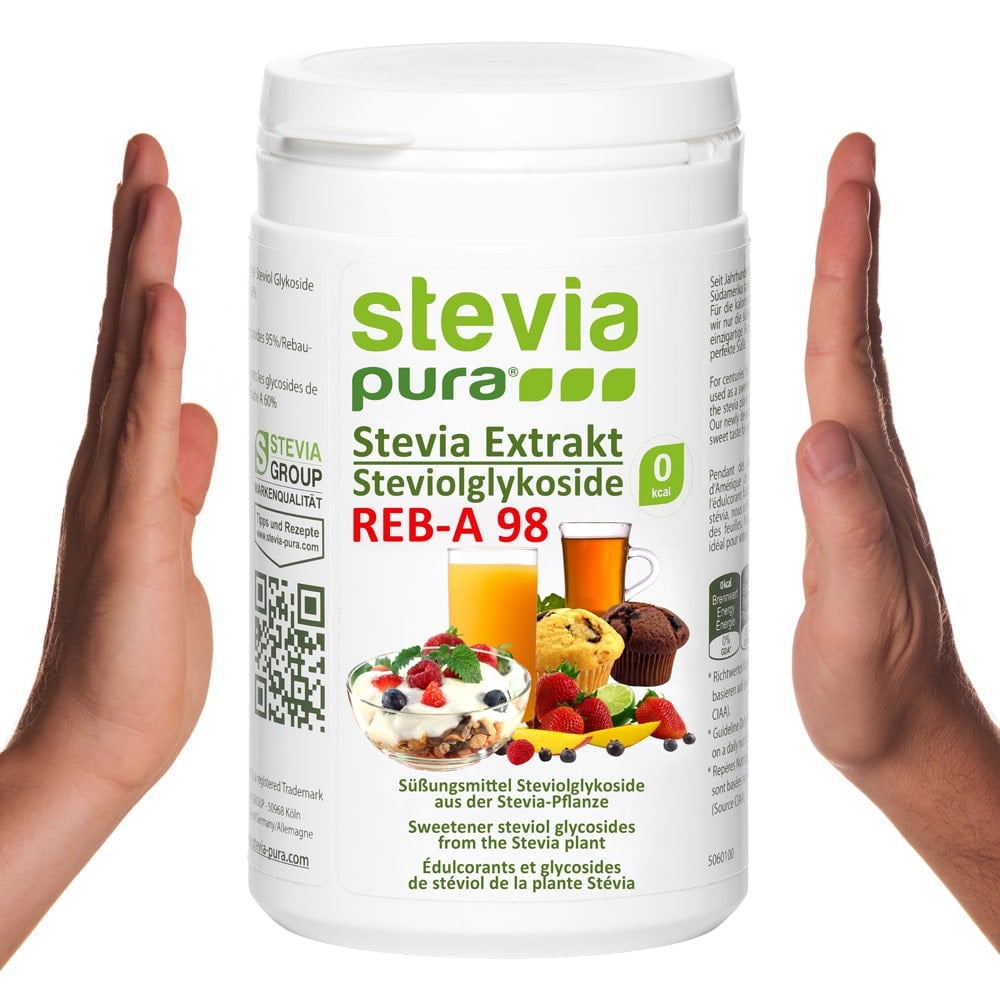
Stevia extract Rebaudiosid-A 98% with the best taste.
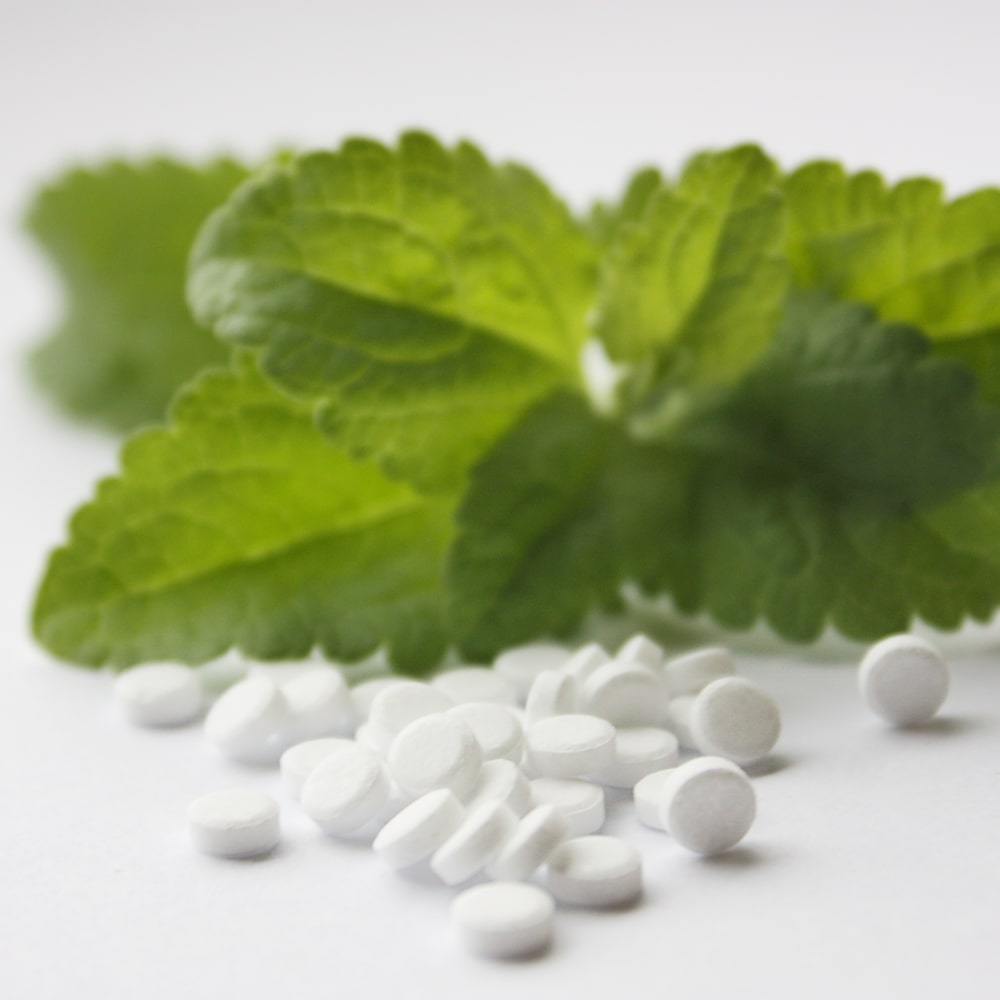
Easy dosage of Stevia sweetener tablets for drinks.
The fewer additives the Stevia products contain, the higher the quality. If you want to save calories, avoid the powder form of Stevia from the supermarket. They often come with maltodextrin or sucralose to make dosing easier. Dosing is easier with Stevia sweetener tablets and Stevia liquid sweetener. The pure Stevia powder (Stevia extract without additives) offers a very good price-performance ratio due to its high sweetening power and yield.
Easy dosage of Stevia tablets for drinks. Stevia is up to 450 times sweeter than household sugar! To avoid an overdose of the sweetener, Stevia tablets require so-called carriers. For this reason, Stevia in tablet form is very suitable and practical for on the go. An unpleasant taste occurs either when the dosage is too high or when low-quality Stevia raw materials are used.
Stevia in liquid form is much more versatile. For sweetening yoghurt, muesli, desserts and smoothies, the sweetener from the bottle is very easy to dose. But here, too, you should look at the back of products from the supermarket. Often fructose, sucralose, dextrose or other chemical sweeteners are added to liquid sweeteners. The list of ingredients on the label will tell you!
As with most products, sustainability also applies to Stevia: unfortunately, this is often difficult for consumers to recognise. The cheaper a mass-produced product is, the more likely it is that it is not a sustainable product. Organic or fair-trade labels are indicators of organic cultivation and fair trade for Stevia leaves. We are familiar with these for coffee and tea, but also for Stevia. Basically, the following applies to pure Stevia extracts: No BIO approval in the EU.
Stevia as a sweetener for coffee
In contrast to many other sweeteners, Stevia evokes a pleasantly sweet taste in coffee. The majority of coffee drinkers want to sweeten their coffee at least a little. However, if you want this sweetening to be healthier, it is better to avoid household sugar and use a better alternative such as Stevia.
Stevia is one of the most popular and also healthiest sugar substitutes among the various sweeteners and sugar substitutes available. Consumed in moderation, it has a pleasant sweet taste. It stabilises blood sugar levels and does not cause cravings.
Honey is another good sugar substitute. It has been used in many ways for thousands of years. Unfortunately, honey does not taste very good in coffee. In daily life, honey is a good substitute for sugar. For example, in baking, muesli or desserts. To ensure sustainability as well as health, the same applies to honey as to all other products: quality before quantity!
